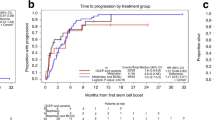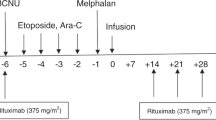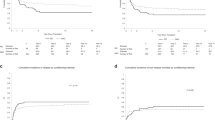Abstract
Randomized trials conducted by the Intergroupe Française du Myelome (IFM) demonstrate that the use of high-dose chemotherapy (HDCT) and stem cell transplantation (SCT) improves event-free (EFS) and overall survival (OS) in younger patients with multiple myeloma (MM). Nevertheless, current HDCT regimens remain inadequate as all patients ultimately relapse following SCT. In an attempt to improve the OS of MM patients post-SCT we used an escalated HDCT regimen incorporating both intensified melphalan (160 mg/m2) and fractionated total body irradiation (12 Gy) to maximize the dose response of myeloma cells to these agents and included infusional etoposide 60 mg/kg in an attempt to eradicate clonal B cells potentially contributing to the myeloma clone. One hundred patients with MM received this intensified SCT regimen. The 100-day treatment-related mortality was 12% predominantly reflecting the development of interstitial pneumonitis (IP) in 28% of patients of whom 7/28 (25%) died. The predicted 5-year OS and EFS following the diagnosis of MM were 60% and 35%, respectively. The median OS from the time of transplant is 41 months and the median EFS is 28 months. More than two prior chemotherapy regimens, previous radiation therapy (RT) and the presence of an abnormal karyotype involving chromosomes 11 or 13 were significantly predictive of poor outcome. Interferon maintenance was not associated with improved outcome. Intensification of the HDCT regimen utilizing etoposide together with escalated melphalan and TBI increases morbidity and mortality without increasing OS beyond that reported with less toxic regimens.
This is a preview of subscription content, access via your institution
Access options
Subscribe to this journal
Receive 12 print issues and online access
$259.00 per year
only $21.58 per issue
Buy this article
- Purchase on Springer Link
- Instant access to full article PDF
Prices may be subject to local taxes which are calculated during checkout
Similar content being viewed by others
Author information
Authors and Affiliations
Rights and permissions
About this article
Cite this article
Abraham, R., Chen, C., Tsang, R. et al. Intensification of the stem cell transplant induction regimen results in increased treatment-related mortality without improved outcome in multiple myeloma. Bone Marrow Transplant 24, 1291–1297 (1999). https://doi.org/10.1038/sj.bmt.1702060
Received:
Accepted:
Published:
Issue Date:
DOI: https://doi.org/10.1038/sj.bmt.1702060



